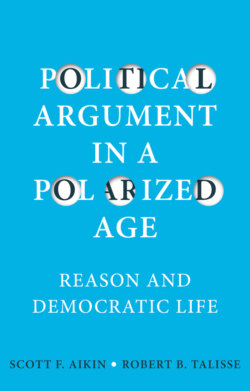Political Argument in a Polarized Age

Реклама. ООО «ЛитРес», ИНН: 7719571260.
Оглавление
Scott F. Aikin. Political Argument in a Polarized Age
Contents
Guide
Pages
Political Argument in a Polarized Age. Reason and Democratic Life
Copyright page
Acknowledgments
1 Democracy in Dark Days
Civility and the Owl of Minerva Problem
2 Civility and Its Discontents
Democracy as a Society of Equals
Political Disagreement among Equals
Civility in Political Disagreement
The Demands of Civility
3 Evaluating Argument
Argumentation and Its Values
Abuses of Argumentation
4 Our Polarization Problem
Two Kinds of Polarization
How Does Belief Polarization Work?
The Polarization Dynamic
Polarization Undermines Democracy
Note
5 Political Ignorance
Ways of Being Ignorant
Tribal Citizens
6 Simulated Argument
Argument as Rhetoric
Argument as Group Affirmation
Memeology
7 Fake News
What is Fake News?
An Institutional View
The Demand for Fake News
The War for Your Mind
8 Deep Disagreements
Deep Disagreements and the Good, Bad, News
Charity and Disagreement
Calling Disagreements “Deep”
Depths of Disagreement
Note
9 Civility as a Reciprocal Virtue
Reciprocal Public Virtues
The Debasement Puzzle
The Path to Debasement
The Need for an Argumentative Culture
10 Repairing Argumentative Culture
Some Rudiments of Deductive Logic
The Turn to Informal Logic
Pathologizing the Opposition
Hearing the Other Side
11 Democracy at Dusk
Scaling Up the Problem
The Fallacy Fallacy
More on Fake News
Trolls, Sock-puppets, and Bots
The Owl in Full View
Index
POLITY END USER LICENSE AGREEMENT
Отрывок из книги
Scott F. Aikin and Robert B. Talisse
So this clearly isn’t a book about how to save democracy. What is it, instead? Well, it’s not a case against democracy, either. Just because democracy can’t be fixed, it doesn’t follow that we should do away with it. This is because doing away with democracy requires that we put something else in its place, something that there’s sufficient reason to think is superior to democracy. But this comparative work is fraught. Notice that the relevant comparison is not between real-world democracy and some idealized nondemocratic alternative. Instead, the relevant comparison is between democracy as it presently functions and some envisioned alternative as it would function were it instated. When the comparison is performed properly, democracy comes out on top. So this isn’t an anti-democracy book; we think there is no better political arrangement than democracy, even when it is functioning poorly.
.....
What we will be calling civility is a set of norms that enable citizens to manage their political disagreements, even in cases where the stakes are high. Civility in general is the disposition to regard fellow citizens as politically equal partners in collective government even when they hold political views that you regard as fundamentally mistaken, injudicious, and even reckless. However, civility is not capitulation. And it needn’t mean social etiquette, like conversation with soft tones and maintaining a veneer of niceness. Rather, civility as we understand it in this book is composed of the dispositions needed to disagree well even when disagreeing vehemently, to hear each other’s reasons, make the stakes clear, and look at the various positives and negatives in ways that get to the bottom of the matter. Civility is a commitment to norms of proper argument.
Now, if civility is a matter of good argument, then logic has a political edge. Our examples of arguments that live up to these norms and those that break them will be drawn from politics in the United States – we are writing about the democratic environment that we know best. But we think that the cases are generalizable. The terms and trends of logic and critical exchange show up in political debates well beyond America – “fake news” and “whataboutery” are now global terms. Our overall objective in these pages is to make a case for ways to repair our arguments piece by piece, and repair our culture of civil exchange in the process. Thus, this is not a recipe for fixing or saving democracy, but rather a method for managing the vices that democratic politics engenders. It is an outline of the work that democracy requires of us.
.....